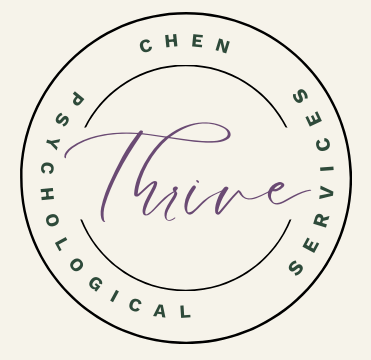Virtual Asian American Therapy for Perfectionism & Burnout
For high-achieving women in their 20s & 30s, whose drive has become a burden, and who are ready to feel whole again.
Culturally attuned therapy that understands the unspoken rules by which you live.
The pressure to achieve, please, and avoid making waves is real. I’ll help you hear yourself again and act from what matters.
What Brings You Here?
You’ve checked all the boxes, yet it still feels empty. In Asian American therapy, we make space to name the pressures you carry (family expectations, success standards, and the unspoken rules) without pathologizing them, so relief doesn’t require abandoning your values. You want something that feels more you, and you feel guilty for even wanting it. You are not ungrateful and you are not broken. You are carrying expectations that were never meant to define you, and it is exhausting to hold it all together.
Many of the women I work with feel like:
Their mind never stops racing, even when they try to rest.
Saying no automatically triggers guilt and worry.
They replay every conversation, certain they said something wrong.
They push themselves to keep everyone else happy, even at their own expense.
They feel pulled between honoring family expectations and following their own path, yet not really knowing what they truly want.
If any of this feels familiar and your success on paper still feels hollow, this work can help you shift from performing to living with intention.
How We’ll Work: Asian American Therapy That’s Practical
You’ve done everything “right,” and it still feels heavy.
In our work together, we pair an Asian American–affirming, culturally attuned lens with Acceptance and Commitment Therapy (ACT), Cognitive Behavioral Therapy (CBT), and Exposure and Response Prevention (ERP) to create change that fits your life. You’ll be taught to:
Integrate cultural insight on collectivisim (e.g., filial piety and maintaining harmony) and individualism (e.g., self-reliance and expressing unique ideas) to create a life guided by intention, not obligation.
Loosen the grip of perfectionism by clarifying what truly matters to you (rather than adhering to an impossible ideal).
Practice boundary-building that honors both your relationships and your needs, so saying “no” no longer feels like a betrayal.
Notice and step back from anxious thought loops, giving you room to choose actions that align with your values.
Replace burnout habits with sustainable routines that nourish your mind, body, and spirit.
Learn More About:
-
Acceptance and Commitment Therapy is known as “ACT” (as in the word, “act”).
ACT is a behavioral therapy that focuses on taking action guided by your core values.
The emphasis of ACT is on reducing the impact of painful thoughts and feelings through:
Cultivating mindfulness skills to make space for difficult inner experiences and remain “in the present moment.”
Acceptance of these inner experiences.
Committed action to build a rich, meaningful life based on what matters to you and the type of person you strive to be, even in the face of difficult thoughts and feelings.
An example might include:
Take a values-aligned step toward the kind of person and the life you want despite fear, guilt, or other difficult emotions (e.g., “I can’t do Saturday, but Sunday works,” then surf 90 seconds of fear / guilt and return to your values).
-
Cognitive Behavioral Therapy is often referred to as “CBT.”
CBT is a type of behavioral therapy that involves:
Learning to recognize and re-evaluate the faulty or unhelpful thinking patterns that contribute to problems.
Becoming more aware of one’s own and other people’s behaviors and what drives them.
Learning techniques to calm the mind and relax the body.
Using problem-solving skills and other strategies to cope with difficult situations.
Developing more self-confidence in the ability to face challenging situations using the skills listed above.
An example might include:
Write a balanced thought for “If I leave at 6, I’ll look like I’m not pulling my weight at work” then leave at 6 twice and record any real feedback.
-
Exposure and Response Prevention is known as ERP (“E” “R” “P”) for short.
ERP is a type of evidence-based behavior therapy used to treat anxiety that we do together
ERP involves:
Working together to choose small, values-guided experiments
The practice of pausing habits (e.g., reassurance-seeking, over-prepping, or people-pleasing)
Going at your pace
Guidance from data to adjust the experimenting
Self-compassion in the process of moving toward a life guided by your values and that feels more you
An example might include:
Delay email checks for an hour and ride out the urge to do so.
What Change Looks Like Here
Six Months into Therapy
✔️ You recover from spirals faster and feel more grounded.
✔️ You pause before committing and set one or two weekly limits.
✔️ You name your top values and make choices that fit them.
✔️ You feel more present with people you care about.
✔️ You offer yourself more grace when you make mistakes.
✔️ You begin to trust yourself.
About a Year into Therapy
💮 You use a brief check-in to notice feelings and choose a next step.
💮 You label sticky thoughts and return to what matters.
💮 You protect your time with a simple pause, capacity check, and clear no or thoughtful alternative.
💮 You make decisions and plan your time anchored by core values.
💮 You aim for excellence where it matters (to you) and good enough where it does not.
💮 You honor family and, at the same time, you protect your energy with time-bound visits and calm, direct language.
💮 You keep small joys on the calendar and rest without earning it.
💮 You give yourself compassion and notice fewer self-critical thoughts.
Clarity
‣
Boundaries
‣
Self-trust
‣
Presence
‣
Belonging
‣
Ease
‣
Energy
‣
Grace
‣
Clarity ‣ Boundaries ‣ Self-trust ‣ Presence ‣ Belonging ‣ Ease ‣ Energy ‣ Grace ‣
A Culturally Attuned, Research-Backed Approach
As a second-generation Asian American psychologist, I understand the silent pressures of the model minority myth and the loneliness of constantly performing.
Together, we’ll unearth unspoken beliefs you may have inherited—such as eat bitter (endure without complaint), maintain harmony at any cost, never bring shame to the family, and your needs come last—and notice how they feed your inner critic. From there, we will decide what to keep, what to revise, and what to set down.
Guiding principles for our work:
Skills in your context: We choose tools that fit your real life at home and at work, so you don’t carry what isn’t yours.
Values set the pace: Your values guide what we practice and how quickly we move.
Doable steps (including exposure when helpful): Small, manageable moves toward what anxiety would have you avoid, with consent and pacing.
Review and adjust: We notice what helps, keep what works, and revise the rest.
Pause and pick a next step: In hard moments, take two slow breaths, name what happened, and choose one next step.
Change that is kind: Self-compassion makes change sustainable, not punishing.
By the time someone reaches out for Asian American therapy, they’re often tired of powering through anxiety, burnout, and guilt on their own and quietly wondering if what they’re feeling “counts” as serious enough for support. It is normal to wonder what we’ll actually talk about, whether we’ll focus on parents and culture, and how this fits with a demanding work schedule. The questions and answers below outline how I think about these themes and what you can expect from our work together.
Asian American Therapy FAQs
-
When I say “Asian American therapy,” I mean therapy that takes seriously the realities many Asian and Asian American clients face: intergenerational expectations, pressure to succeed, experiences of racism, feeling like you have to be the “good child,” and the pull between family obligations and your own needs. In our work, we’ll look at how these forces show up in your daily life (at work, in relationships, in how you treat yourself). We’ll also explore ways to move toward a life that feels more authentic and sustainable while still honoring what matters most to you.
-
No. My goal is not to turn you against your family or culture. Instead, we’ll make space for the full story: the love, the sacrifice, the pressure, and the pain. We’ll talk about how to hold gratitude and boundaries at the same time (i.e., how to care about your parents and community without erasing yourself). We might experiment with new ways of communicating, setting limits, or relating to guilt so that you can stay connected where it feels right and create distance where you need more breathing room.
-
We start by recognizing that these patterns didn’t come out of nowhere. They probably helped you succeed in school, work, family roles, or sport. Together, we’ll look at both the benefits and the costs. Specifically, how constantly pushing, over-delivering, and saying yes has protected you, and how it’s now showing up as anxiety, exhaustion, numbness, or resentment.
From there, we’ll map out the quiet rules you’ve been living by (e.g., achievement, being “the reliable one,” or not disappointing others) and see which ones still fit. Using evidence-based approaches (e.g., ACT, CBT), we’ll practice noticing harsh self-talk, loosening all-or-nothing thinking, and experimenting with small, values-aligned changes in how you work, rest, and relate to others.
Throughout, we’ll keep your larger context in view (family and cultural expectations, workplace realities, and any performance or training goals) so that shifts feel realistic instead of reckless. The goal is to help you pursue what matters most in a way that feels sustainable and genuinely your own.
-
Yes, absolutely. Many of my clients come to therapy precisely because their life looks “fine” or even impressive from the outside (good job, stable income, supportive family), yet they feel chronically anxious, numb, or detached/disconnected inside. This kind of “masked burnout” can be hard to talk about with people who only see your accomplishments. Therapy gives you a private space to say the quiet parts out loud, explore what’s no longer working, and make changes that feel aligned with the life you actually want, not just the life you were told to build.
-
Yes. Anxiety and burnout rarely show up in only one area. We might work on things like speaking up in meetings, feeling less self-conscious in group settings, navigating dating and relationships, or setting boundaries with family around topics like career, marriage, children, or money. Often, the same core patterns of perfectionism, fear of disappointing others, difficulty saying no show up across work, friendships, and family. Our work can cover all of those domains, guided by what feels most important to you
“The rules, like streets, can only take you to known places.”
Ocean Vuong, On Earth We’re Briefly Gorgeous
Start with a brief consultation.





